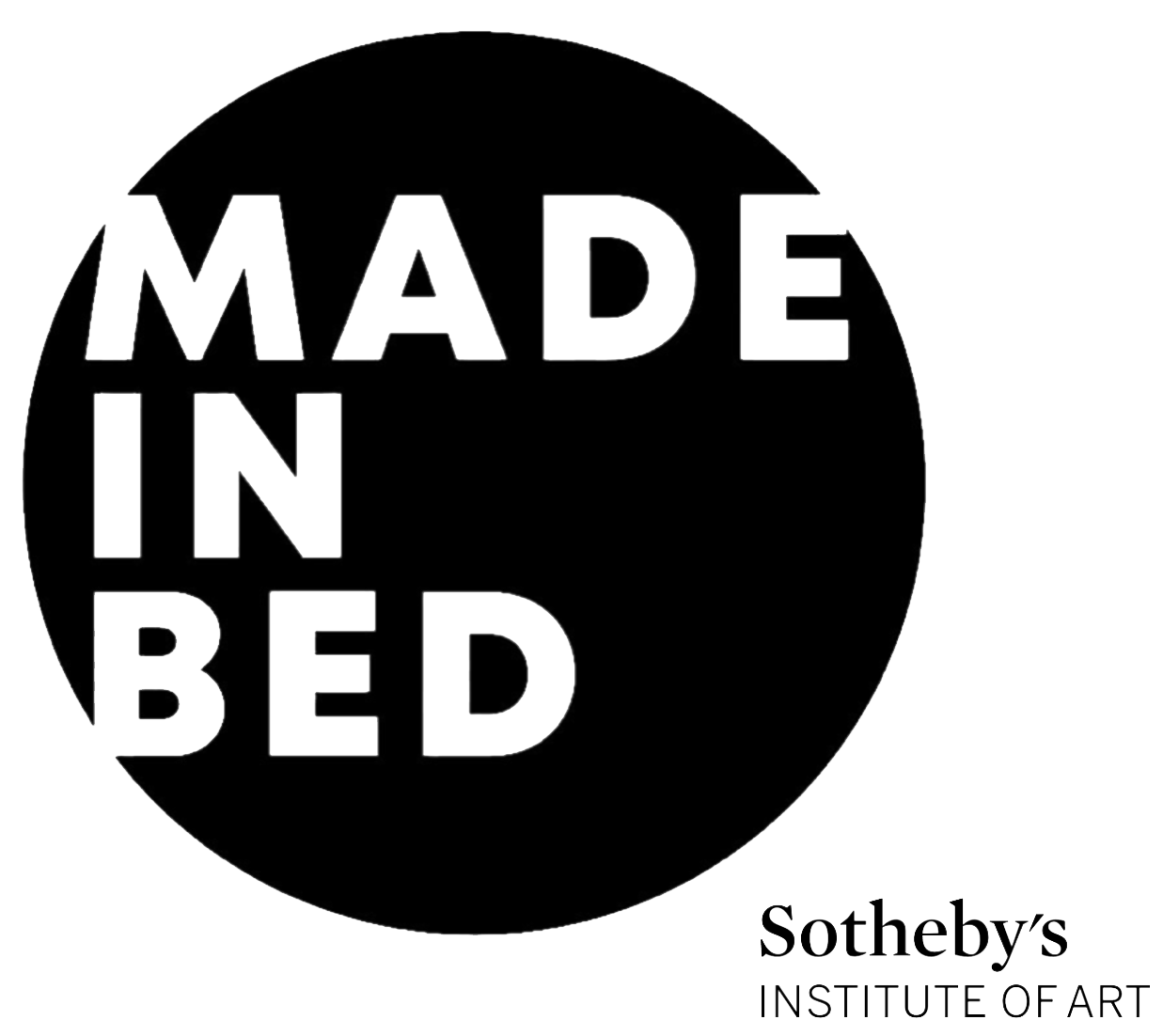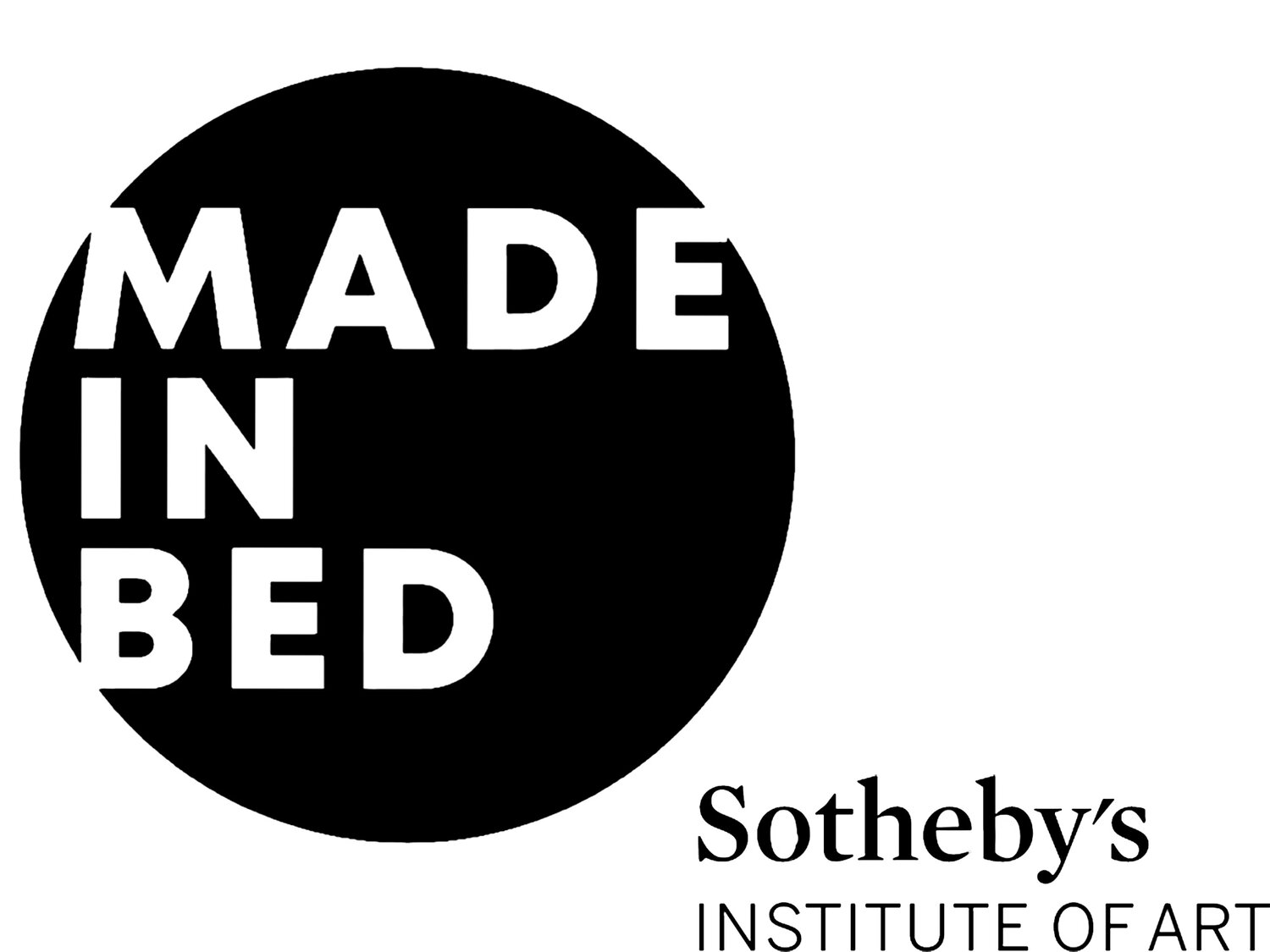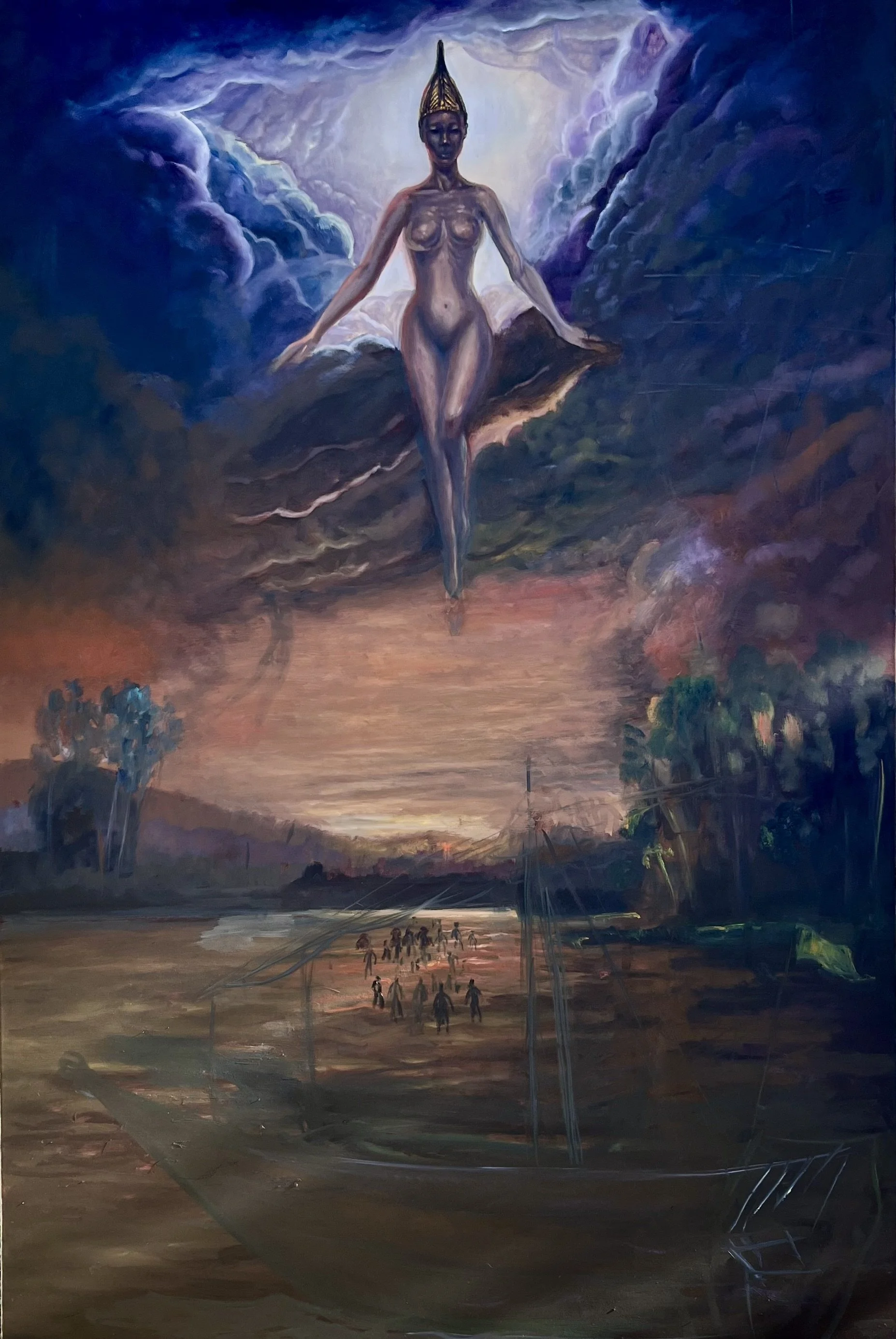Rewriting the Narratives: Oliver Enwonwu's Legacy of Art and Resistance
Oliver Enwonwu has a connection to his artistic heritage that is both deep and personal. Son of the legendary Ben Enwonwu, widely regarded as the father of Nigerian modern art, and the grandson of Omenka Odigwe Emeka Enwonwu, an established sculptor himself, Oliver initially studied sciences and geophysics. However, the call of the canvas proved too strong to resist, leading him to dedicate his career to the world of visual arts.
Studio image. Photo Courtesy: Oliver Enwonwu.
In May 2024, it is at the Mall Galleries that Oliver Enwonwu decided to host his exhibition Oliver Enwonwu: A Continued Legacy, in commemoration of the 30th anniversary of Ben Enwonwu’s passing. Ben Enwonwu is widely regarded as a pivotal figure in modern African art. Born in 1917 in Nigeria, Enwonwu achieved international acclaim as a painter and sculptor. His pioneering efforts played a crucial role in increasing the visibility and appreciation of African art in the postcolonial era. Through his art, which often features African subjects and themes, Enwonwu challenged stereotypes and celebrated the richness of African culture. His legacy continues to inspire and influence the world of modern African art.
Inspired by his father's legacy and his own experiences, Oliver seeks to redefine the narrative surrounding African art and explores ideas such as decolonisation, migration, and black femininity. For Oliver, the choice of exhibiting the collection here was no spontaneous decision- this was the gallery that welcomed Ben Enwonwu’s final European exhibition “Dance Theme” in 1985 and is an instrumental piece to the narratives carried throughout Oliver’s show, allowing him to commemorate his father’s legacy, and inviting visitors to explore their works in conversation with each other.
Ben Enwonwu standing by his sculpture Anyanwu at the Nigerian National Museum circa 1990. Oliver Enwonwu, standing by his father’s statue at Nigerian National Museum in 2022. Photo Courtesy of Kelechi Amadi-Obi.
At the heart of Oliver's artistic practice lies a profound celebration of African identity. The exhibition commences with two striking photographs: one depicting Ben Enwonwu standing beside his iconic "Anyanwu" sculpture, and the other showcasing Oliver in the same pose. Oliver shares, “This is a continuity. Thirty years later, I stand exactly in the same spot, same position. This was not planned, but I thought it would be interesting to provide some context to the exhibition". This powerful imagery instantly serves as a bridge between past and present, highlighting the enduring legacy of the Enwonwu family.
Oliver Enwonwu, Legacy of Resistance, 2024. Photo Courtesy: Greg Allen.
Throughout the exhibition, the juxtaposition of his works with those of his father serves as a poignant reminder of the influence of his lineage whilst also showcasing Oliver’s unique vision. Viewers are taken on a journey through time and space, illuminating pivotal moments in African history and culture narrated by Oliver’s brushtrokes. For instance, Legacy of Resistance, positioned next to two photographs of the Anyanwu, places this statue as a central element of the 1803 Igbo Landing. African tales recount that Igbo captives were brought back to Africa by the water goddess after marching into the sea to reclaim their freedom from slavery. Oliver's interpretation of this historic event transforms the Anyanwu, a symbol of world peace in Ben Enwonwu’s time, into a powerful figure of resistance and resilience in the face of oppression.
Oliver Enwonwu. Body of Power III, 2023 (left) and Were God to Be
a Woman, 2024 (right). Photo Courtesy: Greg Allen.
In addition to exploring the spiritual realm, Oliver’s artistic journey is a testament to the transformative power of the female form and black beauty. He sees femininity not only as a vessel of beauty but also as a symbol of strength and resilience. "In Africa, when a woman goes naked as a form of protest (…) she can even remove a king" Oliver asserts, encapsulating the inherent power that resides within the female body. Drawing inspiration from his father's exploration of feminine subjects in the "Negritude series," Oliver celebrates the majesty of African women, depicting them with a dynamic blend of soft brushwork and chic color schemes. In Oliver's hands, black women emerge as the protagonists of their own narratives, asserting dominance through their poses and expressions as seen in Body of Power III or Spirit in Flight II. They are not merely passive subjects, but agents of change and embody the spirit of resistance.
Oliver Enwonwu: A continued Legacy at the Mall Galleries, London. Photo Courtesy: Greg Allen.
Oliver’s portrait series, depicting West African women, further stands as a testament to his commitment to celebrating the diversity and complexity of the black female experience. While the subjects may remain unnamed, Oliver imbues each with a distinct identity and story, capturing their essence through color, expression, and style. By employing a European portrait style, Oliver challenges stereotypes and redefines the narrative surrounding black identity and African art, promoting a more nuanced understanding of their heritage and culture.
Oliver Enwonwu, Ebony, 2023 (left), collection of portraits (middle), Beauty and Morality II, 2023 (right). Photo Courtesy: Greg Allen.
History, memory, cultural renaissance, restoration, healing, and, above all, knowledge, are symbolised in the above metaphors. For Oliver, art is more than a mean of expression; it's a catalyst for change. He believes in the transformative power of art to shape societies and challenge existing narratives, continuously advocating for those messages through his artworks and business ventures.
When asked about his views on African art, Oliver contends that mere inclusion in existing markets is insufficient; it is equally vital to forge new platforms and institutions. Driven by the empowerment of the pan-African movement created in the late 60s, he opened the Omenka gallery in his home country Nigeria as a symbol of Africa coming together again. As he discusses his path navigating the art business world, it becomes clear that Oliver’s motivations are once again deeply rooted in his own family history. Oliver shares, "My grandfather was known by his nickname, Omenka. Omenka is a name given to very gifted people, and that's where the name of the gallery came from." This gallery fulfills his father’s dream of establishing a gallery in honor of his own father. Although Ben Enwonwu did not realise this project during his lifetime, Oliver took up the mantle, creating the space as a tribute to his father's wish and his grandfather's legacy, whilst using it as a means to support his own fight for pan-Africanism.
Oliver Enwonwu: A Continued Legacy at the Mall Galleries, London. Photo Courtesy: Greg Allen.
Through his exhibition at the Mall Galleries, Oliver honors the legacy of Ben Enwonwu while carving out his own path. Oliver's works are a powerful reminder of the transformative power of art, serving as a catalyst for societal change and the promotion of African identity and culture.
Oliver Enwonwu: A Continued Legacy is on display until June 1st 2024 at The Mall Galleries, London.
Oliver Enwonwu will guide a discussion at the Mall Galleries alongside curator Péjú Oshin, delving into the enduring legacy of African modernism on Thursday 30th May 2024 at 2pm (West Gallery, Mall Galleries). Together, they will explore Oliver's artistic lineage alongside his father, Ben Enwonwu, and delve into themes of femininity, national identity, and cultural resistance.
Many thanks to Oliver Enwonwu on behalf of MADE IN BED.
Lylia Hafiz
Agents of Change Co-Editor, MADE IN BED












